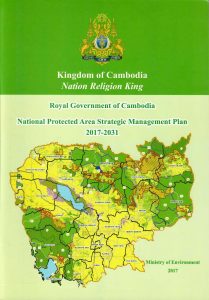Samdech Akka Moha Sena Padei Techo HUN SEN
Prime Minister of the Kingdom of Cambodia
MESSAGE

Protected areas play a critical role in conserving biodiversity and promoting sustainable development. The world’s agricultural systems depend upon biodiversity to sustain genetic plant and animal diversity, to provide pollination services, and to maintain irrigation services. Urban cities depend upon biodiversity to provide clean drinking water to their growing populations. Coastal communities depend upon the natural infrastructure of coral reefs, sea grass beds, and mangroves to buffer them from the impacts of climate change, including sea-level rise and increased storm surges. Rural communities depend upon the natural infrastructure of forests, grasslands and wetlands to buffer them against increased drought, flooding, disease and natural disasters.
While protected areas provide the fundamental goods and services upon which all life depends, it is particularly important to the most vulnerable groups of our society. In Cambodia, indigenous ethnic groups and remote rural communities depend critically upon biodiversity to provide them with basic necessities such as food, water, shelter, medicine and their livelihoods.
As nations begin to plan for a green growth and climate-resilient future, they will be looking for ways to find innovative solutions to meet both their social development needs and their biodiversity conservation goals. Protected areas represent one of the most efficient and effective strategies available for addressing the global challenges of alleviating poverty, while adapting to and mitigating climate change, and maintaining key ecosystem services. Although the upfront investments in protected areas are high, the long-term ecological, social and economic dividends can be enormous.
Today, the protected areas system represents about 39% of the Royal Kingdom of Cambodia. This is one of the highest percentages of national territory within protected areas in the world. In Asia, only Bhutan has a higher percentage of their land protected. However, this network of protected areas is now under heavy pressure and, in response, we have taken important steps to make sure this important national heritage will be protected for future generations in Cambodia. We have given the responsibility for safeguarding all protected areas and biodiversity corridors to the Ministry of Environment and embarked on several reforms to support more effective and efficient management of natural resources, including protected areas.
In this regard, it is my great honour and pleasure on behalf of the Royal Government of Cambodia to announce the official promulgation of the National Protected Area Strategic Management Plan (NPASMP). The NPASMP has reflected our political will and our firm commitment to safeguard a network of protected areas that contributes to the country’s economy and sustainable development, including poverty reduction, through the conservation and sustainable use of its biological, natural and cultural resources and other ecosystem services.
The NPASMP will guide the Ministry of Environment and assist non-governmental organizations and development partners in developing concrete and appropriate measures and actions to strengthen the effectiveness of protected areas in contributing to the National Strategic Development Plan, the National Strategic Plan on Green Growth, the Cambodia Climate Change Strategic Plan, the National REDD+ Strategy and the National Environmental Strategy and Action Plan.
I would like to express my sincere gratitude and appreciation to the Ministry of Environment and its line departments, development partners, and non-governmental organizations that have contributed to making this NPASMP possible.
In closing, I strongly encourage all stakeholders from the Government, private sector, national and international non-governmental organizations and development partners to continue their close cooperation with the Ministry of Environment in the implementation of the NPASMP, which would contribute to the development of Cambodia towards a green, climate resilient, equitable and sustainable society.
Phnom Penh, 30 June 2017
HUN SEN
